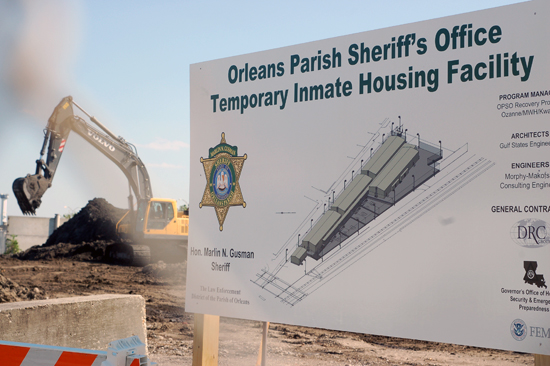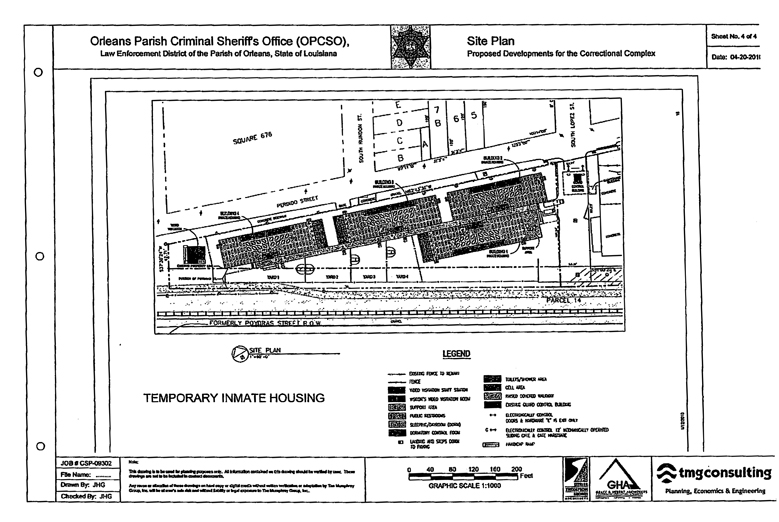Here’s the story from our partners at Fox8 News.
Orleans Parish Sheriff Marlin Gusman has started work on buildings for 400 new temporary jail beds even before the city’s Criminal Justice Working Group – established last week by the mayor to examine the jail expansion – holds its first official meeting.
Gusman didn’t need conditional-use permits for the work because the four main buildings of the new compound will not be permanent, city officials have said.
Bulldozers are moving earth on the site, which covers the two partial city blocks next to Interstate 10 between South Jefferson Davis Parkway and South Lopez Street, and a sign announces the sheriff’s project.
The sheriff told The Lens and our partners at Fox8 News that the buildings will be demolished when his new jail opens, scheduled for sometime in 2013. But advocates for a smaller jail say they’re concerned the temporary buildings might stick around longer.
“The question is: How temporary is temporary?” said Norris Henderson, with Voice of the Ex-offender. “Temporary, here, becomes permanent.
“I think this is one of the real problems with trust in the community,” Henderson said. “They keep tell us they’re going to do something, and then they move ahead and do something else.”
The head of the American Civil Liberties Union’s Louisiana office said questions from The Lens caught her off guard.
“This is brand new news to me,” Executive Director Marjorie Esman said. “I didn’t know a thing about it until this morning, and nor does the public.”
The move comes before Mayor Mitch Landrieu convenes a Criminal Justice Working Group next month to discuss how many beds should be in the sheriff’s new permanent jail complex.
Gusman submitted a document (pdf) to the city’s planning department in April, saying he wants a new permanent facility with up to 5,800 beds. But City Council members put the brakes on the permitting process in July, saying they want to hear from the working group, which will take input from the National Institute of Justice on how many beds should be appropriate.
Meanwhile, the city’s permitting department told (pdf) Gusman’s office in February that he could build four 200-by-50-foot buildings to house 400 more prisoners without any additional conditional-use permits, because “these structures are temporary in nature.”
The sheriff built eight temporary tents to house 704 prisoners after Hurricane Katrina in December 2006, but they’re not going to be demolished until his planned new jail complex is completed either.

In an interview Monday, Gusman said he plans to move prisoners from his 288-bed South White Street facility to fill the temporary buildings, and that the new temporary facilities will not result in any increase in the total number of beds in his jail, which currently has capacity for 3,552 prisoners.
The South White Street facility will be demolished to make way for the new permanent building that’s awaiting council approval.
Gusman didn’t know offhand how much the temporary facility is going to cost, but he said the expense is being covered entirely by the Federal Emergency Management Agency.
The new construction comes even as the nearby city-owned Community Correctional Center, which has capacity for 1,280 beds, stands empty and unused.
Gusman said he had tried to work with the Nagin administration to reopen the Community Correctional Center, but that he hadn’t gotten any cooperation.
Mayor Mitch Landrieu’s top aide, Deputy Mayor Andy Kopplin, said in an interview Monday that the city plans to demolish that high-rise building.
Neither Landrieu’s office nor city permitting officials could define the technical difference between temporary jail buildings, and those that require permits.
The City Council’s Criminal Justice Committee co-chair Susan Guidry pointed to language in the sheriff’s permit application showing he is required to remove the temporary buildings from the site before getting a permit for the permanent jail:
Kopplin said the city doesn’t have a problem with Gusman moving forward with the temporary building, saying the sheriff must determine his immediate needs.
“The sheriff’s gotta run his jail,” Kopplin said. “They’re temporary beds.”
Kopplin said the city is more interested in the working group determining the appropriate number of beds for the sheriff’s permanent facility than in micro-managing Gusman’s decision to build 400 temporary beds.
Like Henderson, Esman looked askance at the concept of a temporary facility, despite the assurances that Guidry said are in place.
“There are temporary classrooms in this community that have been there for 20 years,” she said. “It certainly appears that the sheriff is not being open about what he’s doing — it’s one thing to ask for a permit, but he should go to City Council, and say what he thinks ‘temporary’ means, and when he intends to demolish these buildings.”
Gusman took issue with the implication that he’s hiding something.
“Everything we do is open and transparent,” Gusman said. “We’re not doing anything in a vacuum. I’m looking forward to working with the committee, and I hope they do a good job.”





